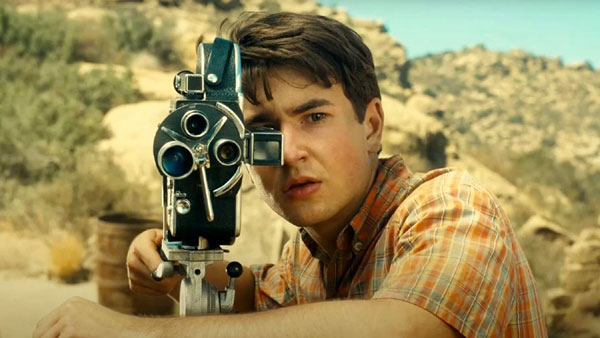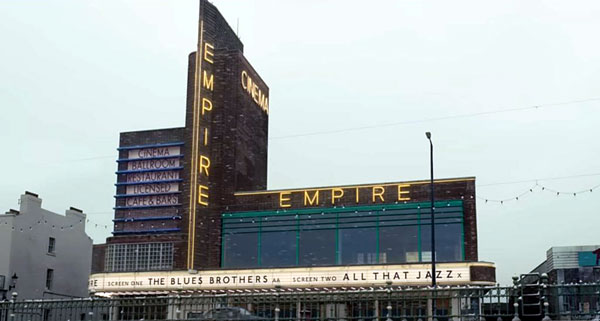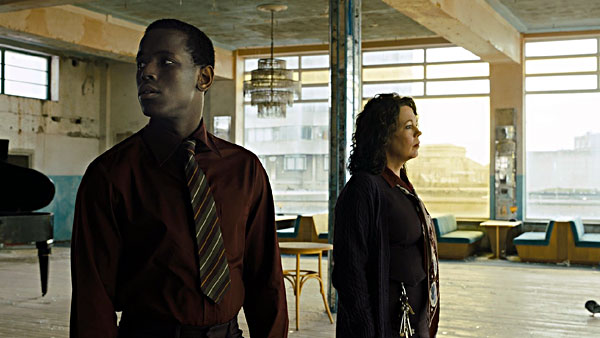|
Cinema Paradiso, the
1988
film
by
Giuseppe
Tornatore,
was
one
of
the
biggest
art-house
hits
of
its
era.
The
film
is
the
story
of
a
director
(Jacques
Perrin)
reminiscing
about
his
childhood
friendship
in
Sicily
with
a
movie-theater
projectionist
(Philippe
Noiret).
A
heart-tugging
comedy-drama, Cinema Paradiso uses
film
as
a
Proustian
spur
to
memory,
arguing
that
cinema
enhances
and
in
some
ways
expands
life.
2022
saw
two
renowned
directors,
Steven
Spielberg
and
Sam
Mendes,
making
similar
assertions
in
their
latest
films, The Fabelmans and Empire
of
Light. Both
films
are
based
on
their
makers'
boyhood
memories
of
moviegoing,
though
only The Fabelmans contains
obvious
autobiographical
elements.
Both
films,
especially The Fabelmans, have
strong
points
in
their
favor,
but
neither
is
completely
satisfactory.
Written by Spielberg and Tony Kushner, The Fabelmans begins
in
1952
with
Burt
(Paul
Dano)
and
Mitzi
Fabelman
(Michelle
Williams)
taking
their
son,
five-year-old
Sammy
(Mateo
Zoryan
Francis-DeFord),
to
see
his
first
movie,
Cecil
B.
DeMille's The Greatest Show on Earth. Sammy
is
frightened
at
the
idea
of
seeing
a
movie,
fearing
that
the
images
are
real
and
could
hurt
him.
But
the
major
set
piece
of
DeMille's
movie—a
spectacular
train
wreck—inspires
him
to
re-enact
the
scene
using
the
expensive
train
set
his
parents
got
him
for
Hanukkah.
Burt
is
upset,
but
Mitzi—innately
understanding
Sammy's
urge
to
recreate
the
scene—helps
him
to
stage
the
crash
again
and
film
it
on
Burt's
8
mm
camera.
The Fabelmans progresses
to
the
teenage
Sammy
(Gabriel
LaBelle),
blessed
with
the
gift
of
his
own
movie
camera.
His
family
is
now
living
in
Phoenix,
all
the
better
for
Sammy
to
find
realistic-looking
backdrops
for
homemade
Westerns
and
war
movies,
with
neighbors
and
fellow
Boy
Scouts
comprising
the
casts.
At
Burt's
urging,
Sammy
films
a
family
camping
trip.
Bennie
Loewy
(Seth
Rogen),
Burt
and
Mitzi's
best
friend,
comes
along.
Everything
goes
fine
until
Sammy,
editing
the
home
movie
footage,
finds
incontrovertible
evidence
that
Mitzi
and
Bennie
are
more
than
just
friends.

The breakup of Burt and Mitzi's marriage, and its effect on Sammy,
constitutes the most powerful section of The Fabelmans. We see that
Sammy is essentially an amalgam of his parents: he has the inventiveness
and problem-solving zeal of his father, a top engineer for IBM, and the
artistic and show-biz inclinations of his mother. Yet the discovery of the
affair sets Sammy against his mother, a resentment that takes years to
heal. It also threatens, though only temporarily, his passion for film.
Rambling and episodic, The Fabelmans is haphazard in its comic relief,
such as a jarring episode in which the Fabelmans acquire a monkey. At its
best, however, it captures the pain and tenderness of family life, as well as
the excitement of a young genius discovering and developing his talent.
Spielberg and Kushner present a believable portrait of a mid-century
Jewish-American family, one where the grandmothers still speak Yiddish.
Unfortunately, Sammy's identity brings him grief in high school in the form
of two anti-Semitic bullies (Sam Rechner, Oakes Fegley). But Sammy uses
his filmmaking talents to win a moral and intellectual victory over the
bullies. He also finds his first girlfriend (Chloe East), a Catholic whose
devotion to Jesus is, shall we say, a little extreme.
Sammy Fabelman's story ends on a high note, with the offer of his first
professional job and an encounter with his hero, John Ford (David Lynch
in a hilarious cameo). LaBelle is engaging as Sammy, and there are several
outstanding performances among the ensemble cast. Williams and Dano
are wonderful as Sammy's loving, decent but hopelessly mismatched
parents. Judd Hirsch has a brief but showy turn as Sammy's great uncle
Boris, veteran of both the cinematic and circus worlds, who lays it on the
line for Sammy in one of the most daunting pep talks in cinematic history.
When you are an artist, Uncle Boris says, inevitably you will be at odds with
your family. Learn to live with it.
Learning to live with what life gives you is a major theme of Empire of
Light, which Sam Mendes directed from his own screenplay. There are no
filmmakers or artists in Empire of Light, and no character who obviously
corresponds with Mendes. But as a story set in a movie theater at the time
of Mendes' adolescence, it radiates a certain awe regarding the act of
moviegoing, if in the end not quite enough.
Empire of Light is set in the Empire, an Art Deco movie theater in the
English seaside resort of Margate, at the beginning of 1981. It is an
unsettled, dangerous time in Britain, when a combination of high
unemployment and Thatcherite rhetoric fans the public rage of racist, neo
-Fascist skinheads.

The film begins with a day in the life of Hilary Small (Olivia Colman),
assistant manager at the Empire. Hers, Mendes tells us, is a miserable
existence. The highlights of her day are her visit to her doctor, who asks
her how the lithium is working, and a joyless tryst with her boss, Donald
Ellis (Colin Firth), who forces her to service him as a prerequisite for
staying employed.
The Empire shows all the hits of its day—9 to 5, Stir Crazy, Chariots of
Fire, Being There. One curious fact about Hilary is that, although she
spends most of the day in a movie theater, she never watches any of the
movies.
One day Ellis introduces the staff to a new usher—Stephen Murray
(Micheal Ward), a young Black man. Stephen says he will work at the
theater only until he can gain admittance to university. His relationship
with Hilary is polite but distant until the day she shows him the theater's
now-disused upper floor, once a showplace but now a roost for pigeons.
Caring tenderly for an injured pigeon, Stephen and Hilary bond, and
before long have begun an affair.
Hilary and Stephen aren't the world's most believable couple, but Colman
and Ward make the pairing work. A bigger problem is that, in its first half, Empire of Light is overly placid, even sluggish. The film doesn't really kick
in until a trip Hilary and Stephen make to the beach, when their pain and
turmoil begin to escalate. By this time, Hilary has stopped taking her
medication; Stephen, meanwhile, faces growing hostility from theater
patrons and random skinheads, culminating in violence near the film's end.
Empire of Light leaves us in no doubt that he regards movie theaters as
holy places, thanks to Roger Deakins' glowing images of the Empire
(played by an actual theater in Margate, the Dreamland). What is less
certain is whether any of his characters share that reverence. Toward the
end Mendes shows Hilary finally watching a movie and being delighted by
the experience. But as a portrayal of a character truly connecting with and
being transported by movies, it feels like too little, too late.

The real reason to see Empire of Light is the performances, especially
those of its two stars. Colman, who has made a glorious career of playing
women on the edge, is mesmerizing as a woman clinging desperately to her
last shreds of sanity and autonomy. Ward projects a clean, touching
honesty and integrity; it is not hyperbolic to compare him with the young
Sidney Poitier or Denzel Washington.
Among the supporting players, I was moved by the decency portrayed by
Tanya Moodie, as Stephen's mother; Crystal Clarke as Ruby, an old
girlfriend of Stephen's; and Tom Brooke as Neil, a coworker who serves as
confidante to both Stephen and Hilary. Colin Firth makes Ellis an all-
too-believable bad boss. Best of all is Toby Jones as Norman, the theater's
philosophical, chain-smoking projectionist, who confesses in an unguarded
moment to having ruined his own life.
Empire of Light doesn't fulfill all of Mendes' ambitions for it, but it does
provide a moving portrayal of the desperation that envelops modest lives,
and of the love and companionship that makes those lives worthwhile.
|